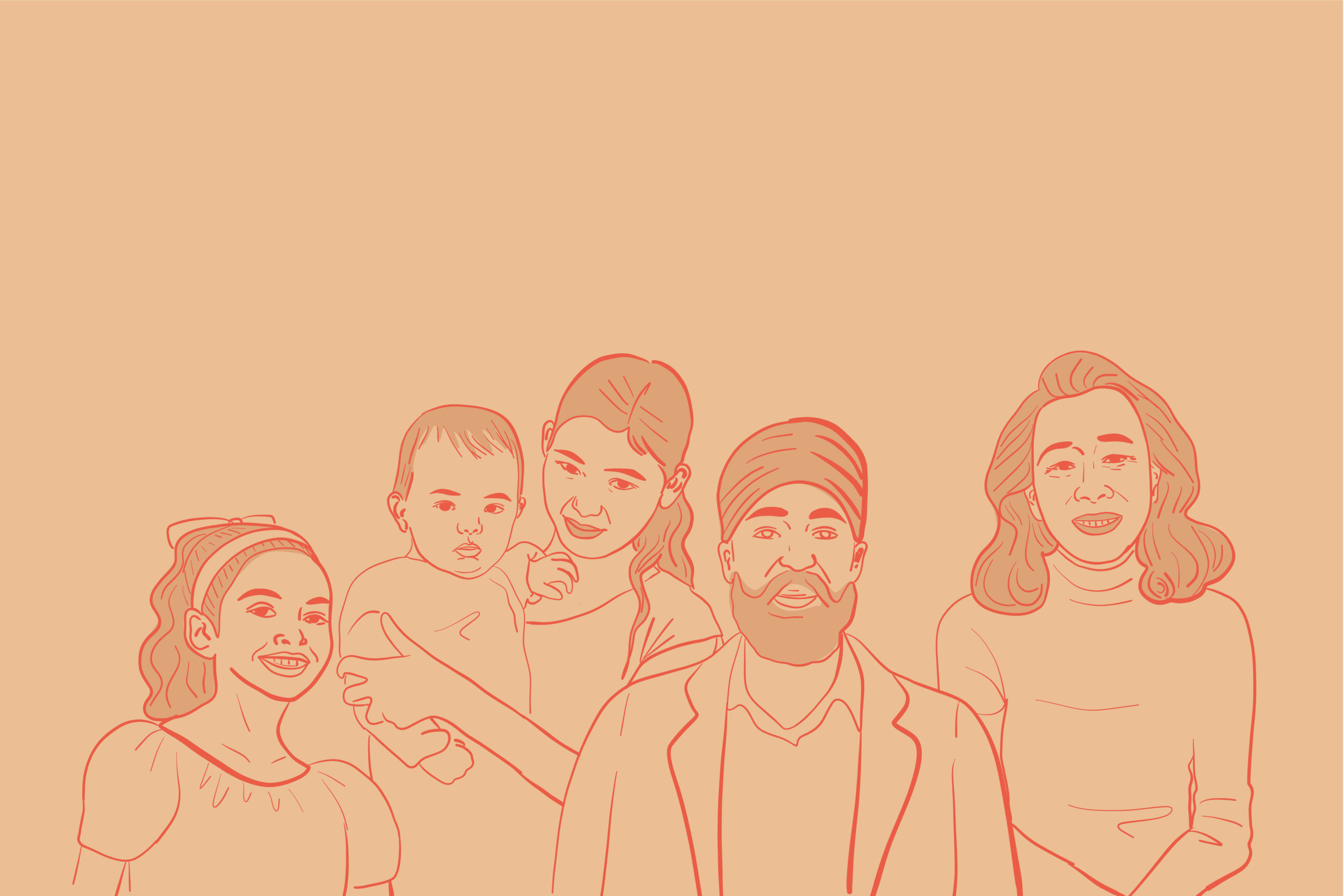May is Asian Heritage Month!
Asian Heritage Month is an opportunity for us to reflect on, learn more about, and celebrate the many accomplishments and contributions Asian Canadians have made to and continue to make to our society, economy, and country.
When we engage in meaningful intercultural dialogue, we are directly creating communities where all can belong and grow.
About Asian Heritage Month
Celebrations for Asian Heritage Month have taken place across Canada since the 1990s. In December 2001, Senator Vivienne Poy brought forth a motion to have Asian Heritage Month officially recognized by the Canadian Government. In May 2002, the Government of Canada signed an official declaration designating May as Asian Heritage Month.
Who is of Asian Descent?
Asia is home to many peoples and cultures:
East Asia - China, Hong Kong S.A.R., Japan, Mongolia, North Korea, South Korea, Taiwan
South Asia - Bangladesh, Bhutan, India, Maldives, Nepal, Pakistan, Sri Lanka
Central Asia - Afghanistan, Kazakhstan, Kyrgyzstan, Tajikistan, Turkmenistan, Uzbekistan
Southeast Asia - Brunei, Cambodia, Indonesia, Laos, Malaysia, Myanmar, Philippines, Singapore, Thailand, Vietnam
Western Asia - Armenia, Azerbaijan, Bahrain, Cyprus, Georgia, Iran, Iraq, Israel, Jordan, Kuwait, Lebanon, Oman, Palestine, Qatar, Saudi Arabia, Syria, Turkey, United Arab Emirates, Yemen
Addressing Anti-Asian Racism
While we celebrate the history of Asian Canadians, it is important to recognize the increase of anti-Asian racism around the world. While many stories of anti-Asian racism come out of the United States, Canada is not exempt. Anti-Asian racism is prevalent in our country and Nova Scotian communities. We have a history of anti-Asian racism dating back to the 1800s, and systemic racism has carried forward to today.
While the recent events in the United States have highlighted the reality that people of Asian descent face many forms of racism – both violently overt and implicit – it is necessary not to be lulled into a false sense of complacency. These racist acts do happen with alarming regularity close to home. According to a First National report, more than 600 instances of anti-Asian racism in Canada have been reported to elimin8hate.org and covidracism.ca since the beginning of the pandemic. We can all learn and do better to help create a society where all can truly belong and grow.
1788 - Fifty artisans, who come with Captain John Mears to help build a trading post, are the first Chinese settlers to arrive in Nuu-chah-nulth territory, Canada.
1858 - Chinese immigrants arrive in the Fraser River Valley (BC) to mine gold fields.
1877 - Manzo Nagano arrives in the first Japanese immigrant in Canada. More will arrive in 1928, and after 1967.
1881-1895 - Over 15,000 Chinese labourers complete the British Columbia section of the Canadian Pacific Railway. More than 600 of them die because of the dangerous working conditions.
1884 - The first Lebanese immigrants arrive in Halifax, many through Pier 21.
1885 - The federal government imposes the Chinese Head Tax of $50 for every Chinese migrant entering Canada. They later raise it to $100 and then $500 to discourage them from immigrating. They were the only ethnic group ever required to pay this tax.
1890 - The first Korean immigrants arrive through connections with Canadian missionaries. More will arrive in larger numbers in the 1940s.
1897 - The first Sikhs come to Canada; some arrive around 1897 and again in 1902. Most find work in lumber mills, mining, railway industries, and later in agriculture.
1907 - An Anti-Asian mob protest rally becomes a riot through Chinatown and Japantown in Vancouver, destroying and vandalizing Asian businesses. Vancouver’s Asian workers stage a strike as a result of this.
1908 - The Government of Canada prohibits any landing of any immigrant who did not come to Canada by continuous journey from their native country. This becomes a barrier to South Asian immigrants because most of their trips require several stops. This also makes immigration impossible for British subjects.
1914 - Canada refuses entry to the Indian immigrant ship Komagata Maru, which is stuck in the Vancouver Harbour along with its 376 passengers. The boat is turned back after a two-month standoff.
1916 - Over 222 Japanese immigrants serve in the First World War, 54 of whom are killed. Thirteen receive the Military Medal of Bravery.
1919 - Rioters wreck six Chinese restaurants in Halifax, destroying property, stealing from cash registers, and physically assaulting Asian business owners. The racially motivated riot specifically targets Chinese businesses and sends 100 people to the hospital.
1923 - The Canadian Parliament enacts the Chinese Exclusion Act, which will be repealed in 1947. While it is active in 1923, fewer than 50 Chinese are allowed to come to Canada. Japanese immigration is limited to 150 a year.
1931 - Japanese-Canadian veterans of the First World War are given the right to vote. Filipino immigrants begin arriving to Canada in 1931.
1939 - The government refuses Chinese-Canadian volunteers for military service in the Second World War. Japanese-Canadians are excluded from military service, and are required to report and register with the Register of Enemy Aliens.
1942 - The War Measure’s Act forcibly removes 21,000 Japanese-Canadians from within the 100-mile restricted zone. Families are taken from their homes, properties are confiscated, and families are moved to internment camps in Alberta and Manitoba. Their properties are sold without their consent.
1944 - More Filipinos arrive, mostly from the United States. Between 1944-1964 770 Filipinos are admitted to Canada.
Ontario passes the Racial Discrimination Act of 1944.
1949 - Restrictions imposed during the Second World War are lifted. Asian Canadians are finally free to vote and move anywhere in Canada.
1951 - The government of Canada, India, and Pakistan allow a quota of 150 Indians and 100 Pakistanis to enter Canada each year. Six years later, the number increases to 300. By 1971, the population increases to 70,000.
1966 - Entry requirements for Filipinos are eased and by 1974, they rank sixth among all immigrants entering Canada. Indonesians of Chinese descent begin arriving in Canada. Between 1966 and 1975, 1366 Indonesians enter Canada.
1967 - More Koreans arrive and, by 1972, their population in Canada is about 7000.
A “points system” is established for immigration.
1969 - Canada signs the United Nations Convention related to the Status of Refugees, which obligates the nation to participate in the international protection of refugees.
1970s-1980s - Nova Scotia experiences the second wave of Lebanese immigrants, fleeing the civil war in Lebanon.
1975 - With the fall of Saigon, 6,500 Vietnamese refugees arrive in Canada.
1978 - The Immigration Act comes into effect in 1978. Between 1979 and 1981, Canada accepts approximately 60,000 refugees from Vietnam, Cambodia, and Laos.
Canada accepts 604 Vietnamese refugees from the freighter Hai Hong.
1985 - Canada’s new immigration policy expands the list of business immigrants to include investors, entrepreneurs, and those self-employed. This increases immigration from Hong Kong as well as Taiwan.
In the Singh Case, the Supreme Court of Canada concludes that a refugee has the right not to "be removed from Canada to a country where his life or his freedom would be threatened."
1986 - Canada was awarded the Nansen Medal by the United Nations High Commissioner for Refugees.
1988 - The Government of Canada formally apologizes and offers compensation for wrongful incarceration, seizure of property, and the disenfranchisement of Canadians of Japanese origin during the Second World War.
1998 - Vivienne Poy becomes the first Canadian of Asian descent to be appointed to the Senate. The senator is instrumental in the designation of May as Asian Heritage Month.
2002 - May is designated as Asian Heritage Month
2006 - Prime Minister Stephen Harper apologizes to Chinese Canadians for the implementation of the Chinese Head Tax.
2015 - Canada passes the Journey to Freedom Day Act which designates April 30th as a national day of commemoration of the exodus of Vietnamese refugees and their acceptance in Canada. Close to 6,600 Bhutanese refugees arrived in Canada. Canada completes a seven-year commitment and welcomes more than 23,000 Iraqi refugees. Canada commits to and begins resettling 25,000 Syrian refugees.
2016 - Prime Minister Justin Trudeau formally apologizes for the Komagata Maru incident. Canada resettled a historical number of refugees, welcoming over 46,000 newcomers and completing its commitment to resettle 25,000 Syrian refugees by the end of February.
2020 - Canada welcomes 46% fewer newcomer permanent residents than in 2019 in part because of travel restrictions due to COVID-19.
Meet Ting
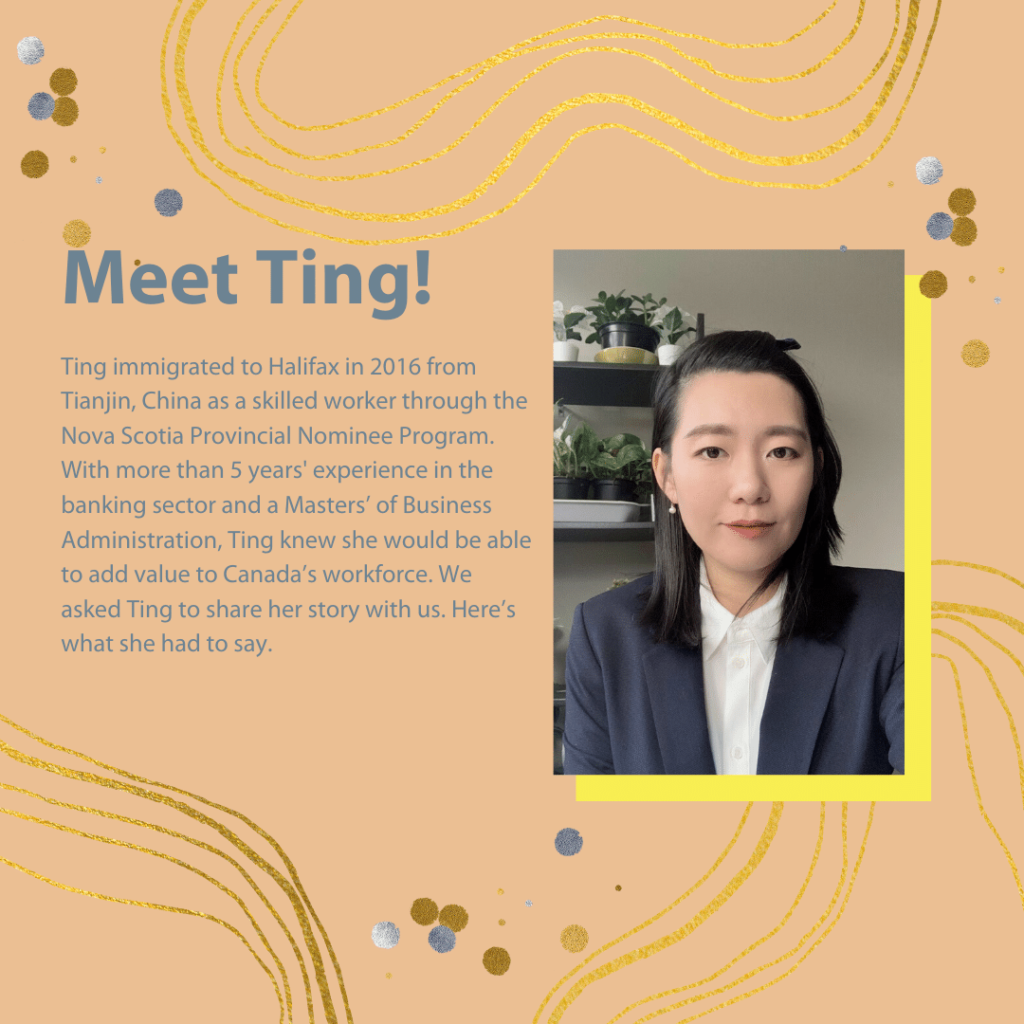
Ting immigrated to Halifax in 2016 from Tianjin, China as a skilled worker through the Nova Scotia Provincial Nominee Program. With more than 5 years' experience in the banking sector and a Masters of Business Administration, Ting knew she would be able to add value to Canada’s workforce. We asked Ting to share her story with us. Here’s what she had to say.
Tell us about yourself and your background
My name is Ting He. I had over five years of working experience in the banking sector in China and a Master's Degree in Business Administration. I became an ISANS client since I immigrated to Halifax in 2016. I participated in several programs with ISANS, such as English class, Welcome Newcomers to Nova Scotia at that time. During the last few years, I spent much time raising my child and caring for my family. Especially when COVID came, I had to postpone my plan on finding a job. Last September, I contacted ISANS again and seek for a job opportunity. Fortunately, my employment specialist helped me a lot.
She gave me as many resources as possible to support and encourage me through recalling my bank work experience and setting up my target job position. I became more confident day by day. After that, she referred me to participate in a Professional Mentor program with ISANS. The program coordinator and my mentor from RBC were fantastic people. They never hesitated to provide me helpful suggestions and information related to finding a bank opportunity. During the process, my employment specialist also referred me to the interview practice program, and I received lots of help from ISANS coordinators and volunteers. They even contacted me after work time to help when they heard I got an interview invitation. I never imagined that at last, my dreams come true. I successfully joined my dream bank just in a few months. I appreciate all the help from ISANS and felt so grateful I got a chance to meet so many brilliant staff in ISANS. They trusted me, supported me, encouraged me. I want to say thank you to all of them, not only to help me find a job but build up my career even change my whole life. Thank you, ISANS!
Where are you from and what was your life like in your home country?
I am from China. My home town Tianjin located in the north part of China and quite near our capital city---Beijing. I was born there, grew up there, studied there. I love my home town and the people.
Why did you move to Nova Scotia?
Canada is my dream Country. Our family moved to Nova Scotia in 2016. Before that, I participated in the Nova Scotia Provincial Nominee Program, seeking Skilled workers overseas. I remembered at that time, my working experience quite fit the financial sector worker's demand for Nova Scotia. Luckily my application got approved, and my family (my spouse and me) became Canadian permanent residents. At the same time, I found I was pregnant, with the double good news came together we were so excited. We landed in Halifax when my baby was four months in my belly. And then we were so happy that our family welcomed our first child in Canada :)
Do you feel fully settled in Nova Scotia?
Yes, when we landed in Halifax, we contacted ISANS as soon as possible to attend the Welcome newcomers to Nova Scotia program, I did the English test and registered for an English class. We were finally settled.
Do you belong to a community of people from the same ethnic background here in Nova Scotia? How important is this to your settlement? If you're not part of a community, does this affect your settlement?
I think I belong to the Asian community in Nova Scotia. Since we came here we met lots of people from this community. Some of them also came from China, we became good friends, they shared many experiences to help us settle down.
What are your dreams for the Asian community in Nova Scotia?
I wish to meet more and more people in this community. We make friends, learn from each other, share experiences. I want to offer my help to become one of the volunteers to help new immigrants settle down in Nova Scotia if I have a chance.
Can you talk about worries or struggles you may have as a member of the Asian community in Nova Scotia?
As an immigrant myself, I understand the barriers newcomers face when coming to a new country, learn a new language and culture, building up networking, and at the same time trying to find a job. I have been in Halifax for over four years and received lots of help from Isans and my community. I am confident that if given the opportunity, I can better help this group of people when they need me.
Meet Tu (Choco)
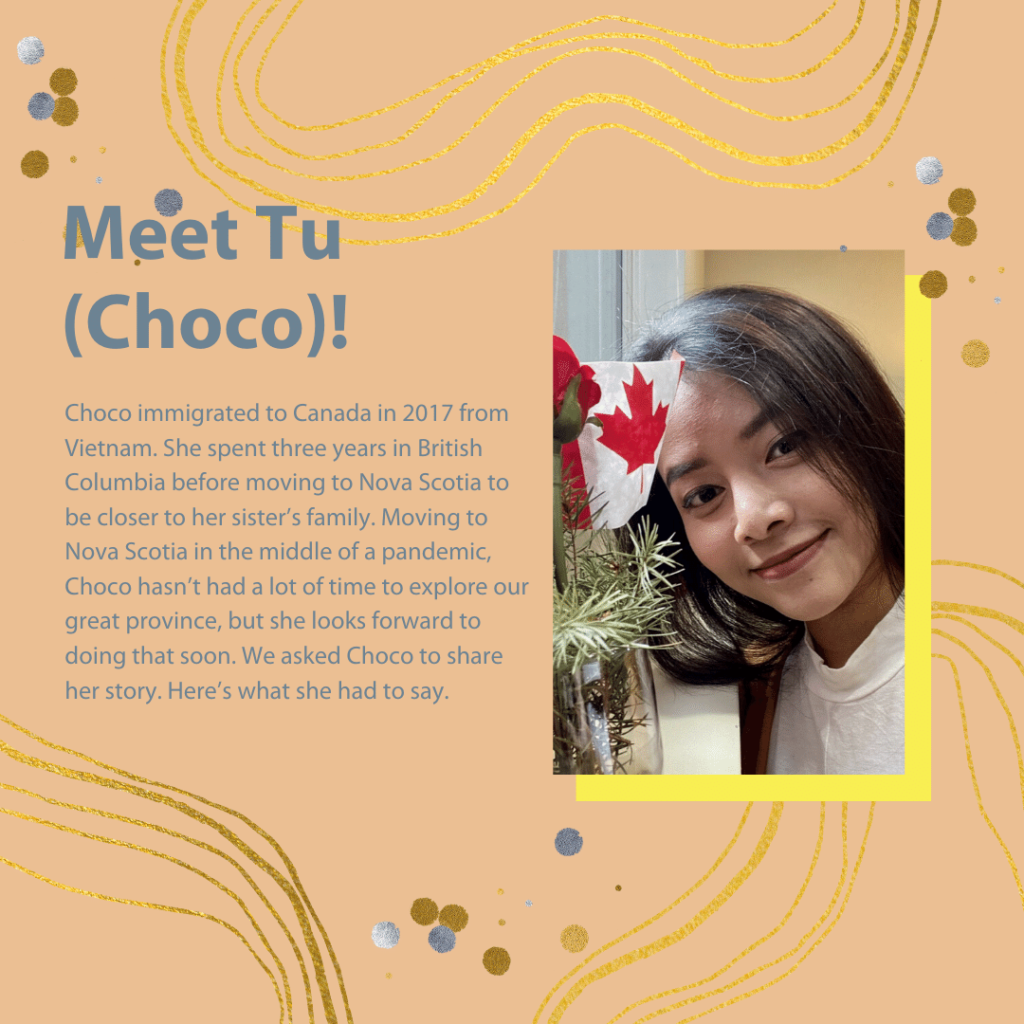
Choco immigrated to Canada in 2017 from Vietnam. She spent three years in British Columbia before moving to Nova Scotia to be closer to her sister’s family. Moving to Nova Scotia in the middle of a pandemic, Choco hasn’t had a lot of time to explore our great province, but she looks forward to doing that soon. We asked Choco to share her story. Here’s what she had to say.
Please tell us about yourself and your background.
My name is Tu Nguyen (Choco). I come from Vietnam, and now I am working as an Educational Program Assistant and online IELTS tutor in Canada. I became an ISANS client last Fall, and I was very happy to be a part of the group called Visible Minority Newcomer at Work. ISANS helped me to be more confident in finding work that fits my educational background and fills my heart.
Where are you from and what was your life like in your home country?
I am from Vietnam. It is a beautiful tropical country with breathtaking beach views along the coasts. It is crowded — or overcrowded at places — but the locals are very friendly and helpful. You'll see smiles everywhere you go. And the foods! Oh they are mouth-watering! Vietnamese people take pride in the traditional foods that are cooked with fresh and nutritious ingredients and passed down from generation to generation. Many foreign tourists say that they really enjoy the food tours and boat tours when they go to Vietnam.
Why did you move to Nova Scotia?
I moved to Nova Scotia to be closer to my sister's family. I had lived in British Columbia for 3 years before flying to Halifax. It was a really long flight and it made me amazed at how big Canada is.
Do you feel fully settled in Nova Scotia?
I feel somewhat settled in Nova Scotia, although I have not had many opportunities to explore and connect with the locals because of the pandemic.
Do you belong to a community of people from the same ethnic background here in Nova Scotia? How important is this to your settlement? If you're not part of a community, does this affect your settlement?
For now I am mostly around my sister's community of Vietnamese friends. They are really nice and kind people. I feel blessed to know them so I think it is an important part of my settlement. If I were not a part of a community, I think I would still be fine because I am an introvert, but I imagine I would be lonely at times.
What are your dreams for the Asian community in Nova Scotia?
My dream for the Asian community in Nova Scotia is that we can grow stronger. Especially in this pandemic, a number of Asians have been reported to be victims of Asian hate crimes. We need to stay together and protect each other.
Can you talk about worries or struggles you may have as a member of the Asian community in Nova Scotia?
I don’t have any worries or struggles.
Meet Mayet
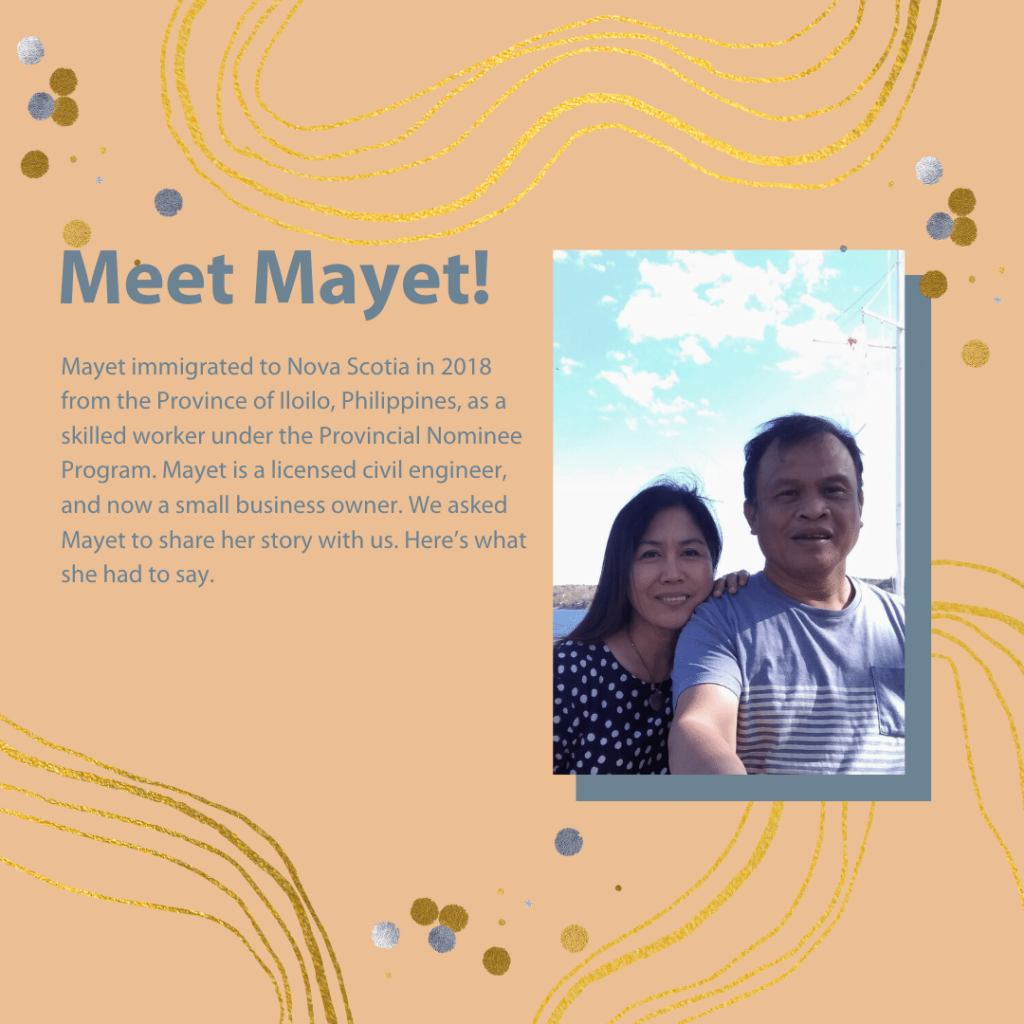
Mayet immigrated to Nova Scotia in 2018 from the Province of Iloilo, Philippines, as a skilled worker under the Provincial Nominee Program. Mayet is a licensed civil engineer, and now a small business owner. We asked Mayet to share her story with us. Here’s what she had to say.
Please tell us about yourself and your background.
I landed as a permanent resident in Nova Scotia under the Provincial Nominee Program from the Philippines in 2018. As a licensed civil engineer, I have work experience as a civil engineer in the Philippines and in Thailand.
I became an ISANS client right on the 3rd day I landed here in Nova Scotia. I have taken almost all the related services of ISANS starting with the Introduction to Nova Scotia Course. Then several relevant courses that follow accordingly such as Job Search Strategies Workshop, Listening and Speaking at Work Program, Orientation and Communication Skills for Engineers. I have as well taken advantage of various seminars/ workshops that ISANS has offered such as Professional Practice and Ethics for Engineers, Fire Safety Workshop, Safety Seminar, and many more.
The latest is being an ISANS Business client, which I become a small business owner. I applied for a cleaning business that definitely was the best decision I did for my family. This small business rewarded me to work at my own pace and mostly paved the way to the financial freedom I dreamed of.
Where are you from and what was your life like in your home country?
I was born and raised at the Province of Iloilo in the Philippines. Since Asia is in the middle of development there is a lot of construction taking place and finding a job there in my field of expertise as a Civil Engineer was not a challenge. The most that I love about my job back there is that I have been to different places around the Philippines. It was like a job plus adventure for every project I had.
Why did you move to Nova Scotia?
Despite having a rewarding job in Asia, the income was never enough to reach our dreams to lift our family's standard of living. So migrating to Canada was the best option for us.
During my application process I have to choose between the provinces of Alberta and Nova Scotia. And since the Philippines is surrounded by the oceans, I figured out Nova Scotia is the closest alike being near the waters. I moved here with my husband in 2018.
Do you feel fully settled in Nova Scotia?
My family is very much happy here in Nova Scotia. We love the province and we are not thinking of leaving already.
Do you belong to a community of people from the same ethnic background here in Nova Scotia? How important is this to your settlement? If you're not part of a community, does this affect your settlement?
Yes, from the minute we landed in the Halifax Stanfield International Airport, my family already felt the warm welcome from my Filipino community. Even though not knowing anyone from here, there is this loving family who offered to pick up us and send us to another family who also selflessly offered to accommodate us. From the support we got from our same ethnic community, the way we settled here went smoothly.
What are your dreams for the Asian community in Nova Scotia?
I am looking forward to a more accommodating Nova Scotia for the Asian Community. As part of an Immigrant Community, Asians are working hard to contribute to the development of the Province. But still, there are occasional incidents of discrimination happening around. Hoping that the government can do more to help such as disseminating information. Nova Scotians must understand that Asians here are peacefully living in the community and contributing to the province's economic development by serving in almost the services such as health, food, and manufacturing sectors.
Can you talk about worries or struggles you may have as a member of the Asian community in Nova Scotia?
As a small business owner from the Asian community, it was not easy at the start to find clients that would trust us. But eventually, with perseverance and keeping up on delivering the best quality of service, I was able to find enough clients. However, to find more clients is my greatest dream as I would like to provide more jobs especially to my fellow Asians.
Meet Ying
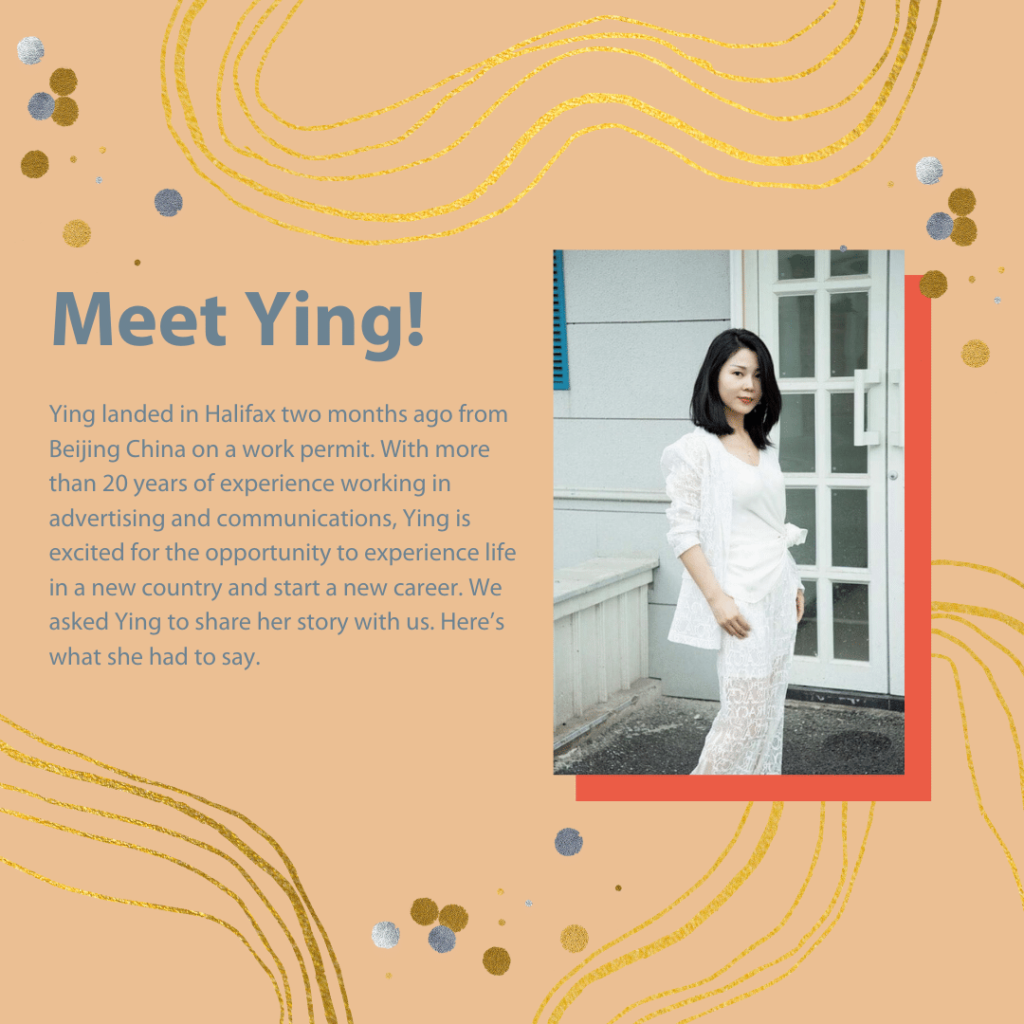
Ying landed in Halifax two months ago from Beijing China on a work permit. With more than 20 years of experience working in advertising and communications, Ying is excited for the opportunity to experience life in a new country and start a new career. We asked Ying to share her story with us. Here’s what she had to say.
Please tell us about yourself and your background.
My name is Ying He, a newcomer in Halifax for 2 months from Beijing China! I hold the work permit to enter Canada and had worked in advertising and Mass media communication area for 20 years. I have a bachelor degree!
ISANS has helped me a lot since I become a client with drive license translation, English level assessment and English course providing and so on
Where are you from and what was your life like in your home country?
Come from Beijing China. I live in a middle-class level in Beijing.
Why did you move to Nova Scotia?
I move here cause I want an international life experience and a new career! I moved in end of February this year and come all the way alone!
Do you feel fully settled in Nova Scotia?
I have not fully settled yet so far.
Do you belong to a community of people from the same ethnic background here in Nova Scotia? How important is this to your settlement? If you're not part of a community, does this affect your settlement?
No, I have not belonged to any community so far! I think it would be helpful with my settlement.
What are your dreams for the Asian community in Nova Scotia?
Company with each other. Help with each other in daily life. Provide more information about education, job opportunity, and entertainment together.
Can you talk about worries or struggles you may have as a member of the Asian community in Nova Scotia?
Yes! cause most Asian people come here with the whole family, I am a single middle-aged woman, it makes me hard to melt into the community and feel embarrassed to communicate with.
Meet Niki

Niki arrived in Nova Scotia in 2018 from Delhi, India to pursue a second bachelor degree in psychology. Now that she’s finished her second degree, Niki looks forward to starting her next adventure as a banking client advisor and the project coordinator for ISANS upcoming Youth Explore Project. We asked Niki to share her story with us. Here’s what she had to say.
Please tell us about yourself and your background.
Most people address me by Niki, my nickname. I am originally from Delhi, India. From being born and brought up in a busy and populated country to finally transitioning to Nova Scotia, Canada. It's been a huge difference but with the help of ISANS I could mitigate many cultural problems and barriers to employment. ISANS has been on my list of organizations where I always have wanted to work for the idea of giving back to the community is everything that I am about. Being a client with ISANS since January, I have been able to take many services like employment counselling, pursuing online job search strategies course, mentorship and many more. I can definitely say this very proudly that due to the constant support and effective networking, I recently accepted a role with RBC as a Client Advisor as well a role with ISANS being the Project Coordinator for the upcoming Youth Explore Project. I can't wait to get started and give back to the community in many ways.
Where are you from and what was your life like in your home country?
I am from Delhi, India. A highly populated country and a very busy city. I spent all my childhood and teenage years in India, graduated from Delhi University with a Bachelor of Arts in English Honours. My passion for Western Music led me to gain professional degrees in music and gave me ample opportunities to perform at concerts and paid gigs. I definitely miss being away from my family yet I am proud of my growth.
Why did you move to Nova Scotia?
I moved to Nova Scotia in September 2018 for pursuing my second Bachelor of Arts in Psychology Major and all by myself. I came as a transfer student directly in 3rd year and hence carried university experience which enabled me to seamlessly complete my 2-year bachelors in time.
Do you feel fully settled in Nova Scotia?
Not quite yet! I am going to start with my banking profession soon and I am looking at acquiring quality experience and moving forward in my path to being immigrated to this beautiful province full of opportunities.
Do you belong to a community of people from the same ethnic background here in Nova Scotia? How important is this to your settlement? If you're not part of a community, does this affect your settlement?
I do often see many South Asians in Nova Scotia which I can relate with and find common grounds. Having someone here from your own community definitely empowers me yet I like to meet new people from different communities and learn from their diverse culture.
What are your dreams for the Asian community in Nova Scotia?
I dream of equal opportunities for everyone and not just the Asian community. I want to share our culture with everyone, celebrate each other's festivals and just cherish the rich experiences of everyone.
Can you talk about worries or struggles you may have as a member of the Asian community in Nova Scotia?
I have not faced many struggles as yet being a member of the Asian community. I am sure I will continue to feel the same way.
Meet Madhuparna
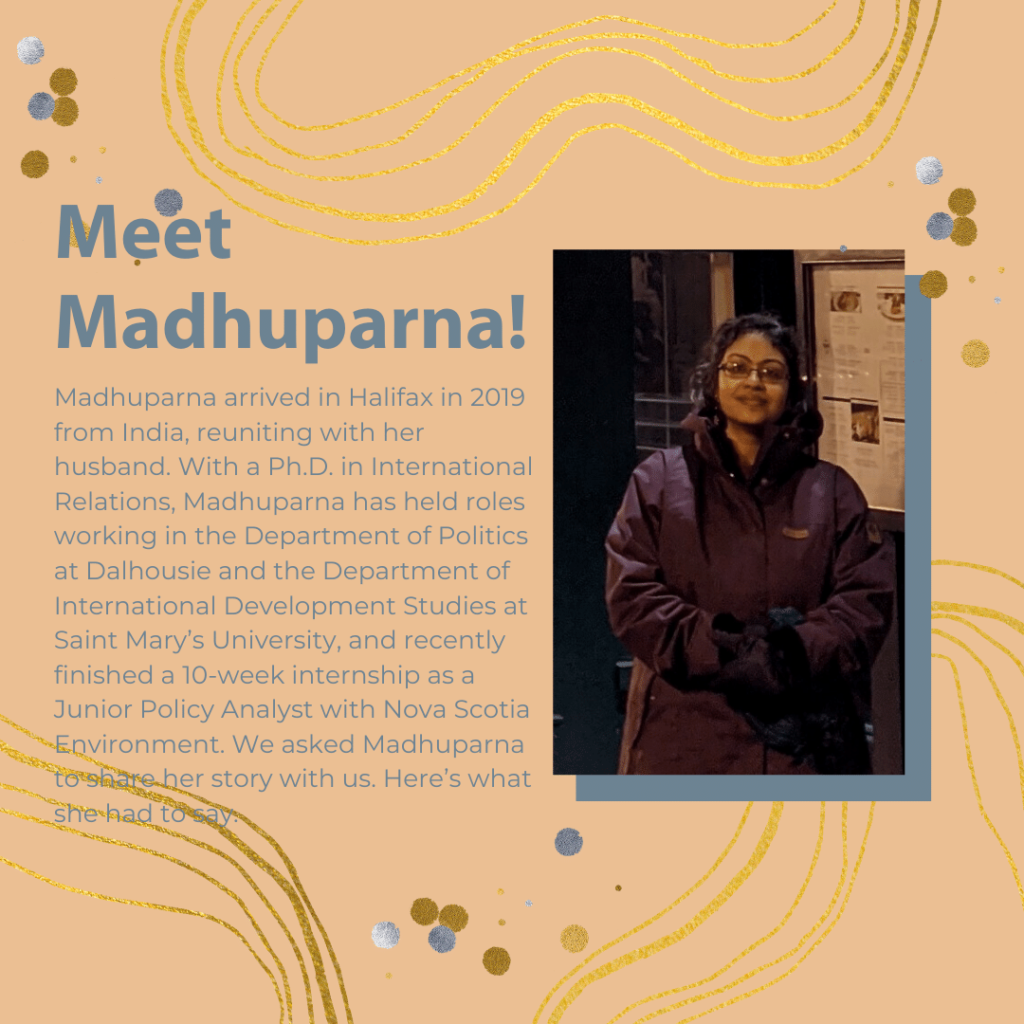
Madhuparna arrived in Halifax in 2019 from India, reuniting with her husband who is working at Dalhousie University. With a Ph.D. in International Relations, Madhuparna has since held roles working in the Department of Politics at Dalhousie and the Department of International Development Studies at Saint Mary’s University, and recently finished a 10-week internship as a Junior Policy Analyst with Nova Scotia Environment. We asked Madhuparna to share her story with us. Here’s what she had to say.
Please tell us about yourself and your background.
With Ph.D. in International Relations, I worked in India as an Assistant Professor of Political Science for 13 years and served in 3 different Universities. I have published books, edited volumes, and research articles in reputed journals. I have also served as Instructor of German Language for 3 years in a reputed language institute of Kolkata and translated books, government reports and songs from Bengali and English in German Language.
Having arrived in Halifax in October 2019, I worked as Teaching Assistant at the Department of Political Science, Dalhousie University in Winter 2020. I have recently concluded working as Part-Time Teaching Instructor at the Department of International Development Studies, Saint Mary's University for Winter 2021.
I was a part of a program titled 'In Flanders Fields: A Canadian Multi-Lingual Project', undertaken by a Toronto-based organization, 'Club Et Cetera', that has translated this celebrated poem of John McCrae in more than 46 languages. I have translated this poem in Bengali and German Languages that were showcased at Fort York National Historic Site, Toronto, in November 2019. This Project has received the prestigious Canadian Ethnic Media Association (CEMA) Award in 2020.
In between, I became a client of ISANS, and participated in Job Search Workshop and Mentorship Program. It was through ISANS that I got a valuable opportunity to work as Junior Policy Analyst in a 10-week Internship Program with Nova Scotia Environment from November 2020-January 2021. From ISANS, I am able to get acquainted with many persons belonging to diverse professions, particularly, Prof. Kelly Dye of Acadia University, Mr. Jason Hollett of Nova Scotia Environment and Climate Change, Mr. Nathan Laird of Halifax Partnership, and members of the Canadian International Council (CIC), Halifax Branch. In fact, the CIC President, Mr. Kevin Deveaux has invited me to deliver a lecture on 'India and her Neighbours' in the coming month.
Where are you from and what was your life like in your home country?
I am from Kolkata, India. Though it was a very busy life in Kolkata, it was a very pulsating atmosphere with my parents, brother, sister-in-law, my little niece, and relatives living close by. India is a land of festivals, and we were always celebrating them with my family together.
Why did you move to Nova Scotia?
I moved to Halifax in October 2019 because of my husband's job at Dalhousie University. Prior to that, my husband used to work in Mississauga since 2015. I used to see him every year with my daughter and parents-in-law as visitors. With his new job at Dalhousie, my daughter and I moved to Halifax as permanent residents.
Do you feel fully settled in Nova Scotia?
Partially, as I am still searching for a full-time position.
Do you belong to a community of people from the same ethnic background here in Nova Scotia? How important is this to your settlement? If you're not part of a community, does this affect your settlement?
Yes, I do. We have a very close-knit Bengali community in Halifax, who have helped us in many ways for settling in this beautiful city.
What are your dreams for the Asian community in Nova Scotia?
If we could let the people of Nova Scotia know about India's rich and diverse heritage through cultural programs in a covid- free atmosphere in future, that would be wonderful.
Can you talk about worries or struggles you may have as a member of the Asian community in Nova Scotia?
Personally, we have not faced any such kind of struggles in Nova Scotia so far. Irrespective of their colour or ethnic background, people of this province are very welcoming. They did not make us feel that we are away from our home. Even in this persisting critical situation in India, our friends, colleagues, and acquaintances are constantly checking in about our families in India.
Meet Zufu
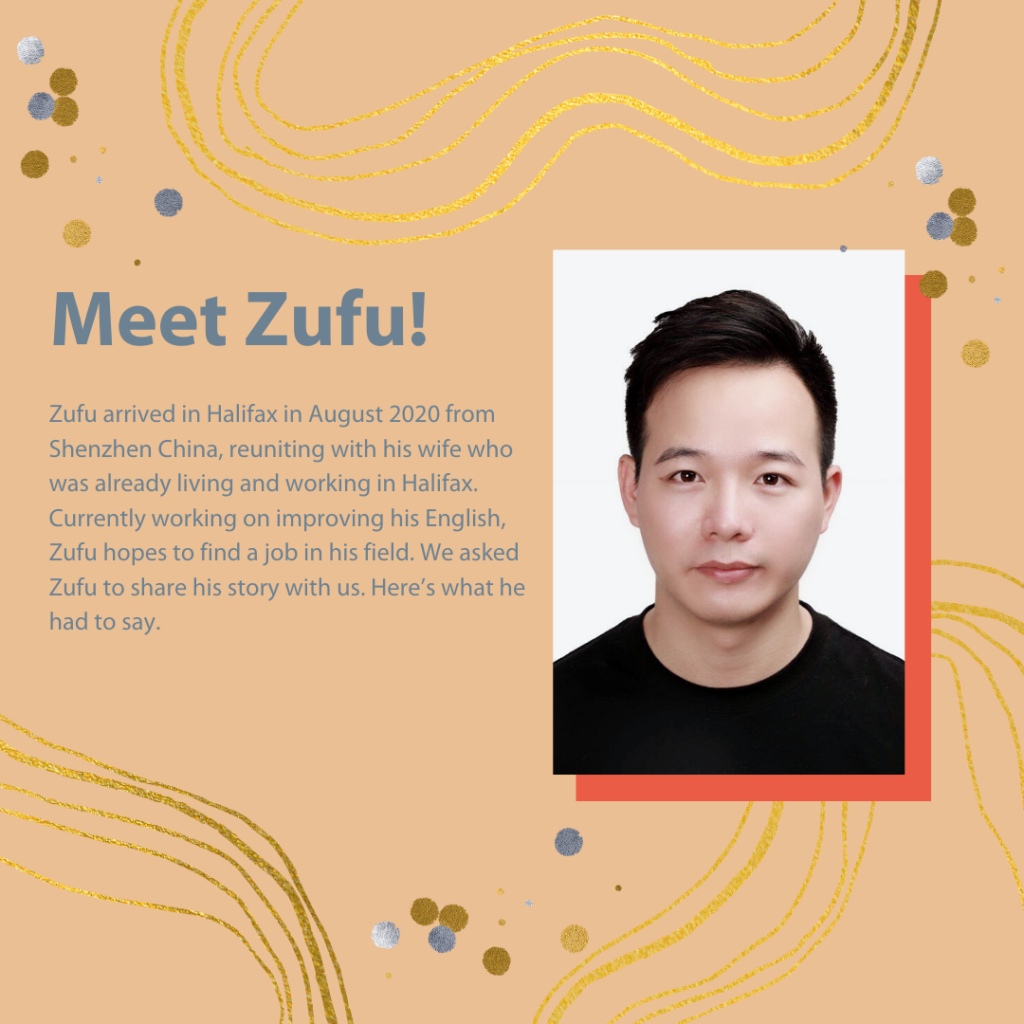
Zufu arrived in Halifax in August 2020 from Shenzhen China, reuniting with his wife who was already living and working in Halifax. Currently working on improving his English, Zufu hopes to find a job in his field. We asked Zufu to share his story with us. Here’s what he had to say.
Please tell us about yourself and your background.
I am Zufu, I come from China. I have graduated from Kwangwoon Uni. in South Korea with a master's degree in 2015. I immigrated to Halifax last August and became an ISANS client in Oct.. I have taken the English Language Learning Courses in ISANS. Now I am studying English in Arash's level 6 class.
Where are you from and what was your life like in your home country?
I am from China. Before I moved to Halifax, I was living in Shenzhen, which is a super big and modern city in China. I had been a hardware engineer and a lab leader in Huawei, which is the world's leading information and communication technology (ICT) solutions provider. I had haven a busy daily life during working in Huawei.
Why did you move to Nova Scotia?
I immigrated Halifax last August. My wife is already working and living in Halifax, I moved to Halifax to live with her.
Do you feel fully settled in Nova Scotia?
Yes, I do. I have bought a house in Halifax, and I am looking for a job related to my professional in Halifax.
Do you belong to a community of people from the same ethnic background here in Nova Scotia? How important is this to your settlement? If you're not part of a community, does this affect your settlement?
Maybe, I am not sure. the community I stay is new and there are many new house are being built. At first, I wanted to choose a community that its people from the different ethnic background. But now I have found more and more Chinese people buy house in my community.
What are your dreams for the Asian community in Nova Scotia?
Some communities would become the places like Chinatown. It would be more interesting.
Can you talk about worries or struggles you may have as a member of the Asian community in Nova Scotia?
I want to find a job related to my professional in Halifax. For me, it is difficult to find the job because there is a few positions in Halifax, I find there are more job opportunities in Central Canada, If I could not find a good job here, I would move to other cities where I could find the job more easily.
We all have a role to play in combatting hate and creating communities where all can belong and grow.
The following resources are intended for:
• individuals interested in learning more about anti-Asian racism, Asian Heritage Month and the contributions Asian Canadians have made to Canada
• individuals of Asian descent who face or potentially can face racism
• individuals who want to learn to be an ally
Learn more about Asian Heritage Month:
• Government of Canada-Asian Heritage Month
• Asian and South Asian Heritage Month
Learn more about anti-Asian racism:
• A Year Of Racist Attacks: Anti-Asian Racism Across Canada One Year Into The Covid-19 Pandemic
• Responding to Hate Toolkit: Combat anti-Asian Racism by Taking Action
Learn more about your rights and how to deal with racism:
• Nova Scotia Human Rights Commission – Know Your Rights
• How Asian-Canadians can speak to their children about anti-Asian racism
• Surviving & Resisting Hate: A Toolkit For People of Color
• Nova Scotia Human Rights Commission: How to File a Complaint
• Report incidents of COVID-19 Racism with covidracism.ca
• Alternatives to Calling the Police Anti-Racist Education for Asian Diaspora in Canada during COVID-19
Learn more about how to be an ally:
• How to intervene in a racist attack
• ISANS Welcome Ambassador Training Program
• ISANS Building Intercultural Competence Workshop
Bangladesh Community Association of Nova Scotia
Canadian Lebanon Society of Halifax
Chinese Society of Nova Scotia
Iranian Cultural Society of Nova Scotia
Korean Association of Nova Scotia
Kurdish Canadian Community Association
Pakistani Canadian Association of Nova Scotia
Vietnamese Association of Nova Scotia
South Indian Cultural Association of the Maritimes (SICAM)
Sri Lanka Canada Association of The Atlantic Region
Filipino Association of Nova Scotia
Islamic Association of Nova Scotia
Dalhousie Southeast Asian Nations Society
Saint Mary's University Bangladeshi Students' Society
SMU Vietnamese Student Society
https://etfo.ca/buildingajustsociety/equityresources/pages/asianheritagemonth.aspx
https://www.canada.ca/en/canadian-heritage/campaigns/asian-heritage-month.html
https://www.canada.ca/en/canadian-heritage/campaigns/asian-heritage-month/important-events.html
https://www.asianheritagemanitoba.com/asian-canadian-history/
https://www.thecanadianencyclopedia.ca/en/timeline/asia-canada
https://thearabweekly.com/halifax-celebrates-130-years-lebanese-immigration
